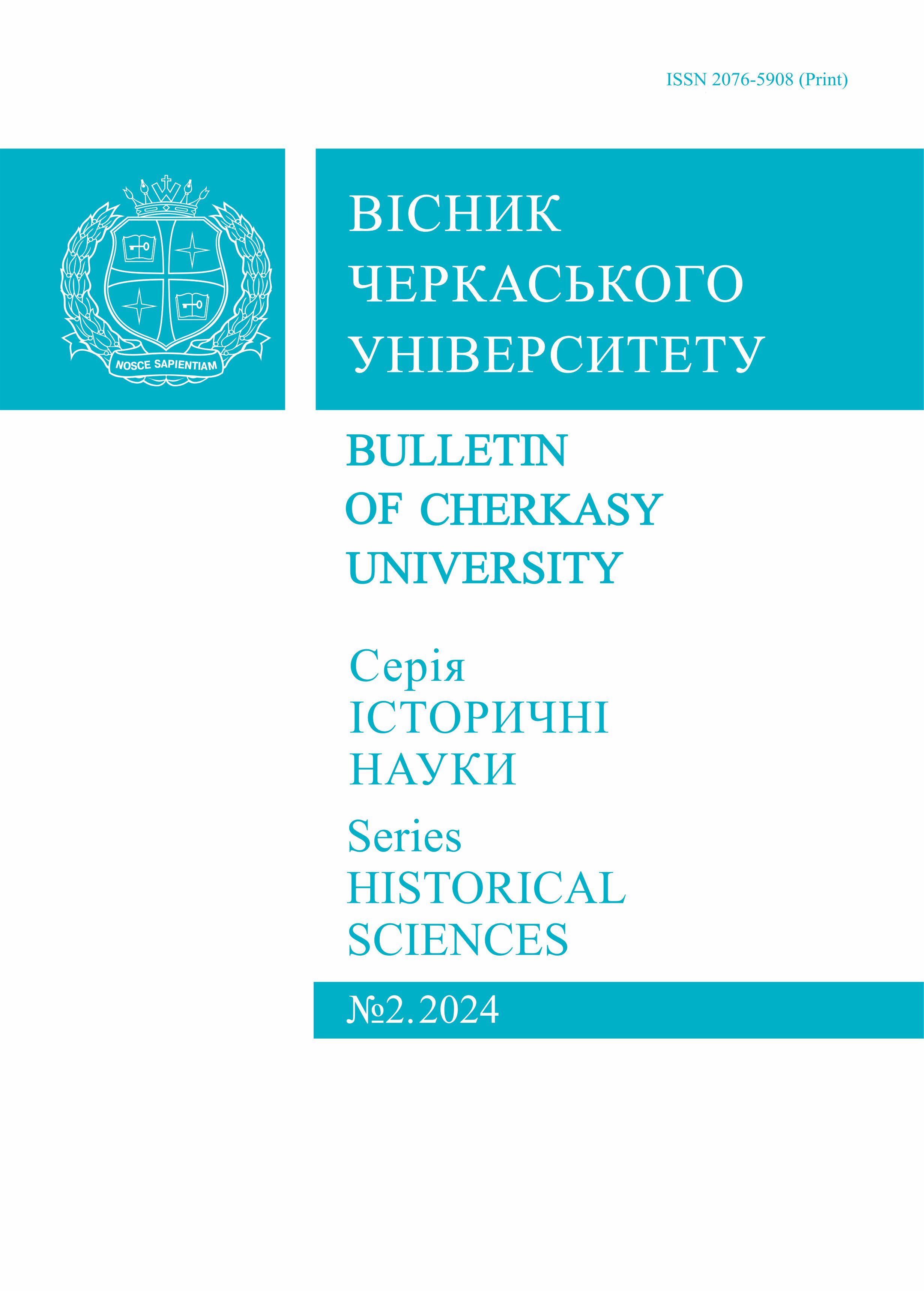G7–Італія: 50 років взаємодії в екологічній політиці
##plugins.themes.bootstrap3.article.main##
Анотація
Анотація. Мета статті – дослідити еволюцію екологічної політики країн G7 та простежити її вплив на Італію, яка є постійним членом організації. Наукова новизна дослідження полягає у розкритті теми взаємодії екологічної політики G7 та Італії в історичному контексті. Автор зосереджує увагу на значенні підсумкових декларацій самітів організації, які містять інформацію щодо змін у міжнародних трендах щодо проведення екологічної політики. У статті пропонується поділ історії екологічної політики G7 на декілька періодів. Оригінальність дослідження полягає у залученні значної кількості джерел з історії G7, а також закордонних досліджень, до яких раніше не зверталися українські вчені.
Висновки. Екологічна політика G7 є продуктом консенсусу між лідерами країн-учасниць організації і визначає лише загальні риси конкретних заходів у цій сфері. Основні результати домовленостей, як правило, відображаються у підсумкових деклараціях регулярних самітів організації. Важливість цієї діяльності полягає у прикладі, який подає світу група найбільш економічно розвинених держав світу всьому людству. На сучасному етапі форум G7 просуває програми захисту навколишнього середовища як невід’ємну частину загальної концепції сталого розвитку. Участь Італії у G7, незважаючи на певні економічні складнощі у розвитку країни, є вагомим підкріплюючим фактором у забезпеченні авторитету організації на світовому рівні. Уряд та суспільство Італії традиційно відрізняються високим рівнем екологічної свідомості і завжди доєднуються до будь-яких помітних міжнародних ініціатив у природоохоронній сфері. Саме ця країна представляє програми захисту навколишнього середовища G7 у Середземноморському регіоні. Окрім того, особливий вплив на соціально-економічний розвиток країни мало рішення про відмову від атомної енергетики після аварії на Чорнобильській АЕС. На сучасному етапі уряд Італії, що діє в рамках затвердженої з 2014 р. концепції енергетичної безпеки, намагається відродити цю галузь за допомогою інших країн-учасниць форуму.
##plugins.themes.bootstrap3.article.details##
Посилання
References
Von Furstenberg, G., Daniels, G. (1992). Can You Trust G-7 Promises? International Economic Insights, 3, 24–27. Retrieved from: https://www.g7.utoronto.ca/scholar/furstenberg1992/document.html.
Bayne, N. (1997). History of The G7 Summit: The Importance of American Leadership. In Explaining Summit Success: Prospects for the Denver Summit of the Eight, Denver, Retrieved from: https://www.g7.utoronto.ca/annual/bayne1997/index.html.
Kirton, J., Kokotsis, E., Warren, B. (2019). G7 Governance of climate change: the search for effectiveness. In The G7, Anti-Globalism and the Governance of Globalization (pp. 90–126). New York: Routledge.
Lewanski, R. (2014). Italy: Environmental policy in a fragmented state. In Governance and environment in Western Europe (pp. 331–351). London: Routledge.
Amadei, P., Croci, P., & Giulia, P. (2004). Nuovi strumenti di politica ambientale: gli accordi volontari. Milano: FrancoAngeli [in Italian].
Pizzimenti, E., & Di Giulio, M. (2023). On the eve of ecological transition? The failed institutionalization of sustainable development in Italy (1992–2020). Italian Political Science Review, 53 (3), 313–332. Retrieved from: https://doi.org/10.1017/ipo.2023.6.
Standish, D. (2009). Nuclear Power and Environmentalism in Italy. Energy & Environment, 20(6). Retrieved from: https://doi.org/10.1260/095830509789625365.
Gambini, M., Vellini, M. (2007). The Kyoto Protocol: Some Considerations About Its Applications in Italy. ASME Power Conference, 1, 397–411. Retrieved from: https://doi.org/10.1115/POWER2007-22026.
Johnstone, I. (2022). Global governance and the Global Green New Deal: the G7’s role. Humanities & Social Sciences Communications, 9, 1–9. Retrieved from: https://doi.org/10.1057/s41599-022-01046-2.
Ivasechko, О. (2013). Peculiarities of the formation of the environmental policy of the European Union. Ukrayins’ka nacional’na ideya: realiyi ta perspektyvy rozvytku [Ukrainian national idea: realities and prospects of development], 25, 113–118 [in Ukrainian].
Zahorskyj, V. (2014). Environmental policy of the EU and problems of the formation of the environmental management system in Ukraine. Social’no-ekonomichni problemy suchasnoho periodu Ukrayiny [Socio-economic problems of the modern period of Ukraine], 3, 210–221 [in Ukrainian].
Perha, T. Yu. (2014). Global environmental policy and Ukraine: monograph. Nizhyn: Lysenko M.M. [in Ukrainian].
Kachuriner, V. (2022). Legal instruments of the environmental policy of the European Union in the field of agricultural production. Problemy ekolohichnoho zakonodavstva [Problems of environmental legislation], 4, 177–181. Retrieved from: https://doi.org/10.32850/sulj.2022.4.2.27 [in Ukrainian].
Tykhomyrova, Ye. (2018). Features of modern climate diplomacy. Mizhnarodni vidnosyny, suspilni komunikatsii ta rehionalni studii [International relations, public communications and regional studies], 1, 18–23. Retrieved from: http://nbuv.gov.ua/UJRN/mvckrc_2018_1_5 [in Ukrainian].
Pavko, Ya. (2023). International climate policy during the Russian-Ukrainian war: challenges and prospects. Visnyk Lvivskoho natsionalnoho universytetu. Seriia yurydychna [Bulletin of Lviv National University. Legal series], 77, 213–225. Retrieved from: http://dx.doi.org/10.30970/vla.2023.77.213 [in Ukrainian].
Declaration of Rambouillet. G7 Information Centre. Retrieved from: https://g7.utoronto.ca/summit/1975rambouillet/communique.html.
G7: Rambouillet Summit (Session 1). Margaret Thatcher Foundation. Retrieved from: https://www.margaretthatcher.org/document/110941.
Declaration of Tokyo, June 29, 1979. G7 Information Centre. Retrieved from: https://g7.utoronto.ca/summit/1979tokyo/communique.html.
Declaration of Venice, June 23, 1980. G7 Information Centre. Retrieved from: https://g7.utoronto.ca/summit/1980venice/communique/index.html.
Prime Minister Cossiga’s Concluding Statement. G7 Information Centre. Retrieved from: https://g7.utoronto.ca/summit/1980venice/conclusion.html.
Statement on the Implications of the Chernobyl Nuclear Accident. G7 Research Group. Retrieved from: https://g7.utoronto.ca/summit/1986tokyo/chernobyl.html.
Kyoto Protocol to the United Nations Framework Convention on Climate Change. Retrieved from: https://unfccc.int/documents/2409.
Gleneagles Plan of Action: Climate Change, Clean Energy and Sustainable Development. G7 Information Centre. Retrieved from: https://g7.utoronto.ca/summit/2005gleneagles/climatechangeplan.html.
G8 falls short on aid pledges, figures show. (2010). The Guardian. Retrieved from: https://www.theguardian.com/world/2010/jun/25/g8-g20.
G7 Brussels Summit Declaration, Brussels, June 5, 2014. G7 Information Centre. Retrieved from: https://g7.utoronto.ca/summit/2014brussels/declaration.html.
Gentiloni: “I migranti economici sono oltre l’85%. Gestire i flussi è una sfida globale”. (2017) Partito Democratico. Retrieved from: https://partitodemocratico.it/gentiloni-flussi-migratori-migranti [in Italian].
G20, scontri di Amburgo: rilasciati 13 dei 16 italiani fermati. (2017). SKY TG 24. Retrieved from: https://tg24.sky.it/mondo/2017/07/09/g20-proteste-amburgo-italiani-fermati [in Italian].
G7 Climate, Energy and Environment Ministers’ Communiqué, Turin, Italy, April 30, 2024. (2024). G7 Research Group. Retrieved from: https://globalgovernanceprogram.org/g7/environment/2024-communique.html.
G7, Pichetto Fratin: “L’Italia soffre più di altri il cambiamento climatico”. (2024). SKY TG 24. Retrieved from: https://tg24.sky.it/politica/2024/04/28/nucleare-ministro-pichetto-fratin.

